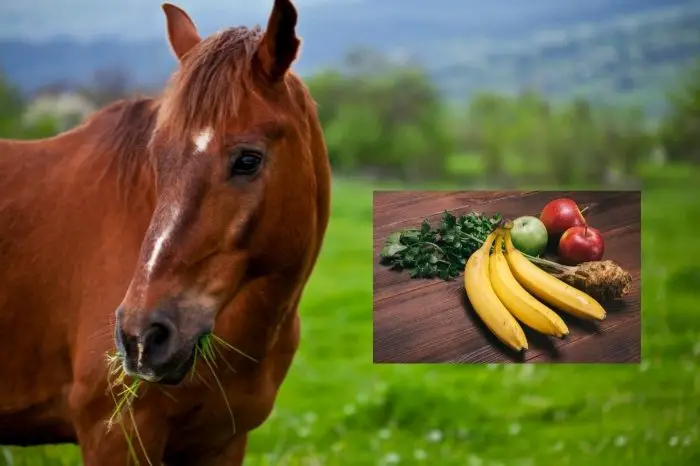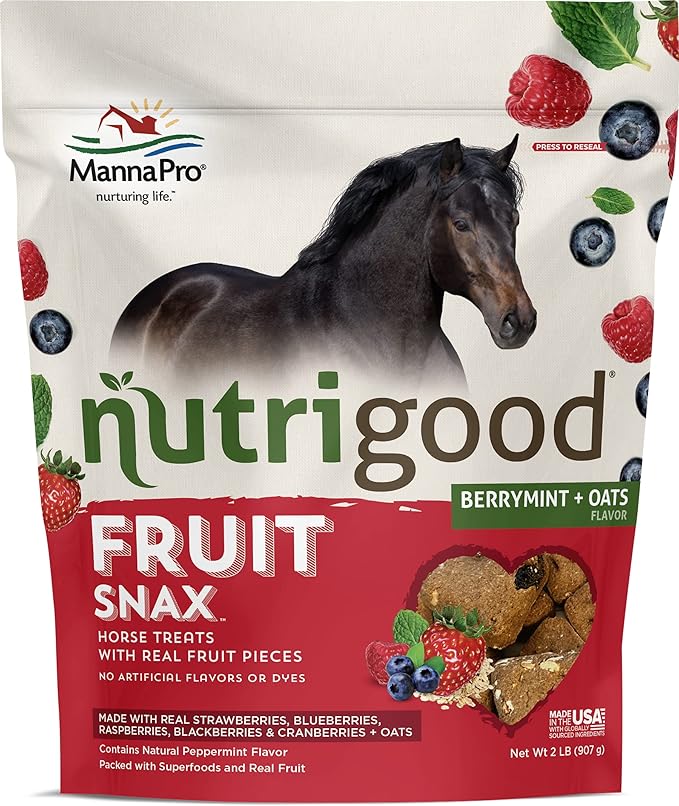Last Updated on April 29, 2022
If you’re snacking on a bowl of healthy fruit, you might be tempted to share them with your horse. But can horses eat blueberries, and are they good for them? And what other unusual fruits might your horse enjoy? Let’s find out!
Can Horses Eat Blueberries?
Blueberries are well known as a ‘superfood’ for humans, but can horses eat blueberries too? Yes, they can! This highly nutritious and flavorsome fruit is perfectly safe for horses to eat, and most horses will enjoy eating blueberries. However, as with all fruits, it is important to feed blueberries to horses in the correct amounts to avoid health problems.
The main diet of a horse consists of roughage – this is hay and grass. These are high in fiber, helping to maintain the health of the digestive system. Fruits are very nutritious, but often have less fiber and more sugar and water than hay.
So, Can Horses Eat Blueberries? Yes, but they should never be fed as part of the main diet. These delicious berries should be an occasional treat or snack, and when fed in this way your horse can regularly enjoy eating blueberries.
Read more about Can Horses Eat Pineapple?
Are Blueberries Good For Horses?
The great thing about blueberries is that they are packed full of nutritional benefits. They are well known for their high levels of antioxidants, which help to prevent cellular aging. They also help to maintain the immune system, protecting against disease and infection.
Blueberries also have high levels of essential vitamins, such as vitamin C, which help to maintain the body systems. They are also high in minerals and fiber and contain a relatively low amount of calories.
So, if these fruits are so good for horses, why can’t we feed more of them to our equine friends? The problem lies with the sensitive digestive system of the horse. Any unusual food that is fed in large amounts will disrupt the balance of this vital body system, potentially causing serious problems. If a horse ate a bucketful of blueberries, it would likely show symptoms of digestive problems such as diarrhea and colic.
How To Feed Blueberries To Horses – Can Horses Eat Blueberries?
The first thing to remember when feeding blueberries or any other fruit to horses is that they should only be given in moderate amounts. Equine nutritionists recommend that fruit or other treats make up no more than 2% of the daily food intake. This equates to around 2 cups of fruit a day for a large horse, and 1 cup for a pony.
Remember that this is the total amount of fruit per day – so if you give your horse a large apple, this will be around one cup of fruit.
Nutrigood FruitSnax Horse Treats | Tasty Horse Treats Packed with Superfoods and Real Fruit Pieces
Blueberries do not need much preparation before being fed to horses, as they are small, soft fruits that do not have a stone in the center. There is no risk of your horse choking on blueberries, and they should be able to bite into these little fruits without any problems.
One precaution you should always take when preparing fruit for a horse is to wash it or peel it first. This is to remove the residues of any chemicals used during the production of the fruit, such as pesticides and fertilizers. So, give the blueberries a good rinse under the tap before you offer them to your horse.
You should also remove any moldy or rotten blueberries, as these are not safe to be fed to horses. If it doesn’t look good enough for you to eat, it is certainly not good enough for your horse!
Click here to Get Info About:
- Horse Legs Are Fingers? Comparing Horse Vs. Human Anatomy
- Horses And Fireworks – How To Solve This Difficult Problem
What Other Fruits Do Horses Enjoy?
We all know that horses enjoy fruits and vegetables, and many of you will feed your horses’ chopped apples and carrots. But did you know that there are some other weird and wonderful fruits that are safe to feed to horses?
Citrus fruits such as oranges are perfectly safe for horses to eat, and some horses will even eat the peel! They tend to prefer sweeter mandarins and oranges to the more bitter lemons and limes.
You can also feed bananas, melons, grapes, raisins, celery, and pumpkin to horses. Any thick peel should be removed first, and the fruit cut into bite-size chunks.

Horses will eat all types of berries, such as strawberries, blackberries, and cranberries. Why not try a fruit salad medley for your horse to enjoy on a hot summer’s day!
There are some fruits to avoid as they are poisonous to horses, including rhubarb and tomatoes.
Summary: Can Horses Eat Blueberries?
So, as we have learned, horses can eat blueberries and many will enjoy eating this delicious and nutritious snack. Blueberries are packed full of essential vitamins and antioxidants and give a little boost of energy to your horse. However, as with all fruits, blueberries should be fed in moderation to horses as they can cause digestive problems and other health issues.
We’d love to hear your thoughts on can horses eat blueberries! Do you love sharing a bowl of blueberries with your favorite horse or pony? Or maybe you’ve offered blueberries to your horse but he didn’t like them? Leave a comment below and we’ll get back to you!
FAQ’s

Kate Chalmers is a qualified veterinary nurse who has specialized in horse care for the vast majority of her career. She has been around horses since she was a child, starting out riding ponies and helping out at the local stables before going on to college to study Horse Care & Management. She has backed and trained many horses during her lifetime and competed in various equestrian sports at different levels.
After Kate qualified as a veterinary nurse, she provided nursing care to the patients of a large equine veterinary hospital for many years. She then went on to teach horse care and veterinary nursing at one of the top colleges in the country. This has led to an in-depth knowledge of the care needs of horses and their various medical ailments, as well as a life-long passion for educating horse owners on how to provide the best possible care for their four-legged friends.
Kate Chalmers BSc (Hons) CVN, Dip AVN (Equine) Dip HE CVN EVN VN A1 PGCE

